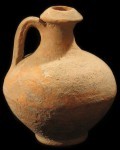The Jar of oil
 It is the most famous jar of oil in Jewish history.
It is the most famous jar of oil in Jewish history.
When the Maccabees came to rededicate the Temple, there was only one jar of pure oil bearing the seal of the high priest.
It would take eight days to obtain a fresh supply. But in an act of faith the one jar was poured into the menorah, and by a miracle the small quantity stretched over eight days.
This is the story, but it is not without its problems.
Why did the high priest not certify larger quantities of oil, enabling each day’s supply to be poured into the menorah but leaving enough available for several more days?
The Chida, Rabbi Chayyim Yosef David Azulay, suggests that it must have been customary to produce the oil in one-day quantities, presumably to guard against contamination.
Why did it take so long to obtain a fresh supply?
The oil was prepared several days’ journey out of Jerusalem, so it took four days to get to there and four days back.
Why do we celebrate the miracle for eight days when the stretching of the one day’s supply lasted only seven days?
There are many answers. It was already a miracle that one day’s supply was found. The strengthening of the quality of the oil already began on the first day.
Rabbi Yosef Karo, editor of the Shulchan Aruch (Bet Yosef to Orach Chayyim 670), suggests that the supply in the one jar was divided into eight from the beginning, allowing at least a brief amount to be burnt each day.
According to Rabbi Chaim Soloveitchik of Brisk, the people could not rely on a miracle providing more oil because that would not be olive oil but some miraculous substance, and it was olive oil that the law required.
In a medieval version of the story the one jar that was found did not even contain enough for one day (afilu yom echad), so even the first day was a miracle.
Another view is that there were two miracles: on the first day it was the miracle of the conquest of the enemy, whilst thereafter it was the miracle of the oil.
Why do we see apparent similarities with the 8-day festival of Sukkot?
In some ways Chanukah compensated for the people’s inability to celebrate Sukkot properly that year. The Talmud already noticed a link between the two occasions (Shabbat 21b).
Apart from keeping Chanukah for eight days, there is a Sukkot connection in the reciting of Hallel. The Second Book of Maccabees recognises the link.



